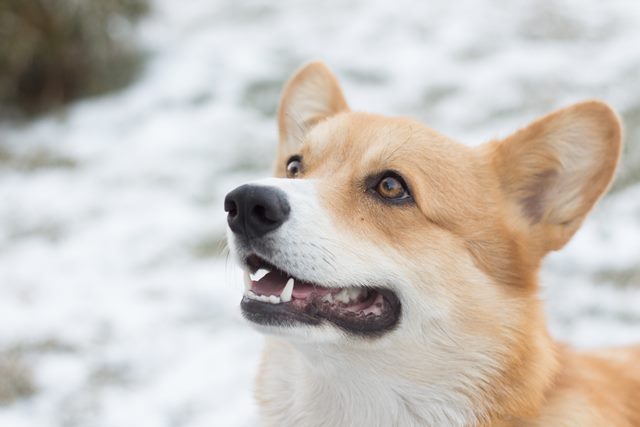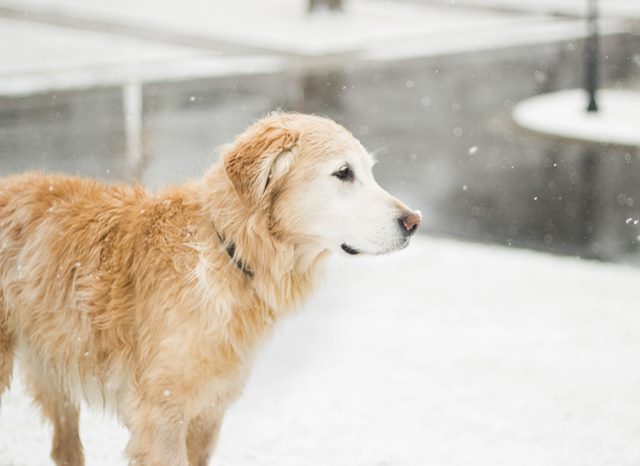Winter Walkies
Even though we humans may like to hibernate during the cold winter months, our canine companions need to be walked all year round, no matter what the weather is doing. To help inspire you and your dog during winter time we have put together our Winter Walkies feature offering you top tips and hints!

Visibility
In winter the long nights often mean we have to walk our dogs in the dark; we therefore need to ensure we all remain easily visible. Reflective coats for you and your dog can help you both stand out to passing traffic. If your dog does not like wearing, or does not need, a coat, then a reflective collar may be a suitable alternative. There are also lots of options of light up collars, accessories and even toys too. If walking in the dark it is sensible to take a torch or head torch with you, so you can see your path and your dog at all times.
Walking safety
Along with visibility, being sensible about where and when you walk your dog in winter can help to keep both you and your hound safe. Try to walk in daylight hours where possible. If this is not possible, then stick to street-lit paths or try and walk with a friend. Keep your dog on the lead when walking by the road, and keep them to your side which is away from the traffic.
Warmth
Both you and your dog should wrap up against the colder spells. A warm coat, gloves and hat for you, and you could even consider popular outerwear for your dog such as warm coats, knitted jumpers or even boots!
Dry them off
Keep plenty of towels in the car or by the front door so that you can thoroughly dry off your pooch if you return from a particularly wet, snowy or muddy walk.
Check their feet
When you return home check your dogs’ feet; remove any clumps of ice or mud which may cause discomfort if left. If the roads have been gritted it can be a good idea to gently rinse their feet when you get home, and then towel dry. In long haired dogs, it may help to neatly trim the fur on their feet in winter months.
Beware of frozen water
Do not allow your dog to walk or run on frozen ponds or lakes. The ice is often not thick enough to hold their weight and they may quickly end up in the freezing water beneath which could be very dangerous. Should this occur, do not follow them in but call the emergency services to assist you.
Provide water
If puddles are frozen over then be sure to take water with you on your walk and stop regularly to offer your dog a drink.

Are their ID details up to date?
Whilst we all hope it won’t be necessary, walks in the dark may increase the risk of your dog going missing. Ensure the contact details on their collar and microchip are up to date.
Keep them on the lead in heavy snow
Heavy snow fall can be disorientating for us and our canine companions. Snow may make it difficult to keep your dog in eyesight, and can cover certain smells, which they would usually rely on to find you/ get home. It is safest to keep them on the lead if there is heavy snow falling.
Extra considerations for the elderly
Just like older people may be prone to ‘feeling the cold’, old dogs often have poor thermoregulation and may require extra help, such as a warm coat, to keep them warm. It is well known in people that arthritis can be more painful in cold weather; the same is thought to be the case in dogs. If you notice your dog becoming stiffer this winter, make a trip to your vets. They may need some joint supplements or stronger pain relief and anti-inflammatories to keep them comfortable. For more information view our feature on How to help manage stiffness and mobility difficulties in your Pet
Avoid anti-freeze
Anti-freeze is very poisonous to dogs and cats, and ingestion can cause acute kidney failure which can be fatal. It is safest not to let your dog drink from garden features such as fountains which may have anti-freeze added to the water in winter. Also be cautious of puddles near cars etc. as screen wash tends to contain anti-freeze too.
We hope our tips help you and your dog have a happy healthy winter!
Looking for more Winter advice?
Read about Looking after your dog in winter
Read about Keeping your pets safe over the festive period
Read about Foods to avoid
News

